- Home
- Susan Beth Pfeffer
This World We Live In ls-3 Page 4
This World We Live In ls-3 Read online
Page 4
“Tell me everything you know about Matt and Jon,” she said. “Don’t leave anything out.”
“They left on Tuesday,” I said. “They went to the Delaware River to catch shad. They’re supposed to come back on Saturday. That’s all I know. What do you know?”
“Exactly the same thing,” Mom said. “Oh, Miranda. You gave me the scare of my life.”
I stared at her, and we burst out laughing. It’s funny: Horton slept through all the hysterics, but as soon as he heard us laughing (and I have to admit, our laughter was pretty hysterical), he got up and walked out of the room. Which made us laugh even more.
“What about Mrs. Nesbitt?” Mom asked. “What were you talking about, Miranda?”
I thought about Mom, how terrified she must have been that she might never see any of us again. I thought about all the people she’s lost this past year.
“Nothing,” I said. “I saw a field with a lot of fresh graves. The Beasley boys were there. That’s who I meant when I said the boys were there. But Mrs. Nesbitt probably isn’t. I hope not anyway.”
Mom nodded. “There must be graves like that all over,” she said. “All over the world. Come on, Miranda. Change into something warmer, and I’ll make you some soup.”
I did as she said. I even ate the soup. But I saw what I saw, and I know—with a cold, cruel certainty—that someday, somewhere, we’ll be part of a mountain of bodies reaching up toward the sunless sky.
Chapter 4
May 12
“Matt and Jon will be home tomorrow,” Mom said, as though saying it often enough would guarantee it would actually happen. “And we’re going to need a place to store the fish.”
“You really think they’ll have that many?” I asked. My fantasies, when I’ve allowed myself any, are shad poached in white wine, a stuffed baked potato, and sauteed green beans. With a salad beforehand and chocolate mousse for dessert. And a hot fudge sundae.
“Let’s hope so,” Mom said. “I hate to think they’re spending all their time in the cold not catching anything.”
“Except cold,” I said, which Mom might have thought was clever a year or so ago.
A year ago. May 18th is the anniversary of when the asteroid hit the moon. May 12th a year ago, I had no idea of how my life, how everyone’s life, was about to change. A year ago my biggest problem… Well, a year ago I didn’t have any problems. Maybe I thought I did but I didn’t.
“I think the cellar would be best,” Mom said. “It should be cool enough, at least until we salt the fish.”
I don’t like cellars. I don’t like ours and I don’t like Mrs. Nesbitt’s. Friends of mine had basements that were converted into family rooms or used for storage, but we have an old-fashioned dirt cellar. Toadstools grew there in the summer, but Mom was afraid they were poisonous, so we never ate them.
Mushrooms. I added them to my imaginary shad dinner. Feeling virtuous, I also added a chocolate peanut butter pie.
Mom grabbed our biggest flashlight and opened the cellar door. I followed her, to prove what a good daughter I am. After yesterday she still needed some convincing.
“Oh no,” she said, shining the light onto the floor. Not that you could see the floor. The reflection of the light shone right back at us. The cellar was completely flooded.
“I guess we’ll have to find someplace else for the shad,” I said, unconvinced there’d be enough to worry about. “Maybe the garage?”
“The shad’s not the problem,” Mom said, which could have fooled me, since the shad had been the problem thirty seconds earlier. “We’ve got to clear the cellar out. We can’t let it stay flooded.”
“I guess the sump pump stopped working,” I said. “All the snow melting and the rain and not enough electricity. Why can’t the cellar stay flooded? At least until Matt and Jon get home?”
“Don’t you think they’ve done enough for us?” Mom asked.
Actually I didn’t. As far as I was concerned, they were having a wonderful adventure, away from home, away from Mom and the sunroom and mounds of bodies.
“Mom,” I said, trying to sound mature and reasonable and not like a whining crybaby. “That’s an awful lot of water for us to mop.”
“We’ll use the pails you brought home,” Mom said, because sure, it was fine for me to break into people’s houses just as long as I stole pails and crossword puzzle books. She walked down a few steps, then turned to me and said, “Get the folding yardstick. It’s in the hardware drawer in the kitchen.”
I found the yardstick and brought it to her. Mom climbed down the rest of the stairs and stuck the yardstick into the water. “Six inches,” she said. “The water is six inches deep.”
“We can’t clean up all that water ourselves,” I said.
“Why not?” Mom said. “Do you have anything better to do?”
Suddenly Romeo and Juliet seemed very appealing. “I’ll get the pails,” I said, “but I don’t know how we’re going to do this.”
“Me either,” Mom said. “Bring all the pails and that big pot we used to make soup in. Oh, and the mop. We’ll need it eventually.”
“How about boots?” I asked.
“Absolutely,” Mom said. “And another flashlight we can leave on the steps.”
So I searched the house for anything that could hold water and anything that could keep it off us.
“I’ve done this before,” Mom said when I returned to her loaded with everything I could find. “Once when the sump pump stopped and another time when the water heater burst. A little water never hurt anyone, but it’s not a good idea to let the cellar stay like this.”
“How are we going to empty the pails?” I asked.
Mom paused for a moment. “It is going to take forever, isn’t it?” she said. “I’ll fill the pails and you can empty them outside. Tell you what. Open the kitchen window and lift the screen up and throw the water out. It’s not the best method, but it’ll save us time.”
“We’ll be better off with six containers,” I said. “You can fill four while I throw out two.”
“Good thinking,” Mom said. “Get the biggest pots you can find.”
So I did. And while I was looking for them, Mom put on her boots and started filling the pails. By the time I put on my boots and walked down the stairs, Mom had all three pails and the soup pot pretty much full. I took two pails, carried them from the cellar through the kitchen, and flung the water out. As I walked downstairs, I thought that this was the stupidest thing I’d done in a year, maybe in my entire life.
On the other hand, it kept Mom from staring at the door, willing Matt and Jon to come home. And it was a distraction from thinking about piles of dead bodies.
It didn’t take more than a half dozen trips before my legs and back began aching. And I knew, after a half dozen trips, that if we’d stuck the yardstick back in the water, it would still register six inches.
But Mom kept at it, and her body had to be aching every bit as much as mine, from bending with the pot, filling it with water, and dumping the water into a pail.
We worked silently for a half hour, the only sounds the water sploshing around and my footsteps up and down the cellar stairs. I thought about saying how ridiculous this all was, but I knew better than that. I went for the lighthearted approach instead.
“It’s a shame we can’t let the water freeze,” I said. “I could have an indoor skating rink.”
Mom stood upright and stretched. “Do you miss skating?” she asked.
Compared to what? I thought. Food? Friends? Dad? But all I said was “A little bit. I liked skating on the pond this winter.”
“I used to love to watch you skate,” Mom said. “Don’t tell Matt or Jon, because I enjoyed their track meets and baseball games, but I liked going to your skating competitions the most. It broke my heart when you had to give it up.”
“Mine, too,” I said.
“Sometimes I think of all the things we had and lost before,” Mom said. “Your skating. Luck
y, our cat before Horton. Even my parents, dying when I was so young. Maybe we lost the things we loved then so we could survive losing every thing else.”
“We haven’t lost everything else,” I said, taking the pails from her. “We still have each other and the house and Horton.” And a flooded cellar and a backache.
“Isn’t there some kind of Greek myth about this?” I asked on one of my return trips. “Some guy who has to empty out the ocean with a spoon and by the time he finishes, it rains for forty days and nights?”
“If there isn’t, there should be,” Mom said. “How long have we been at it?”
“Too long,” I said, and checked my watch. “More than an hour.”
Mom stretched again. “I was in labor fourteen hours with Matt,” she said. “That was worse.”
I thought about how unlikely it was I would ever meet any guy, fall in love, get married, have babies. Especially since I was going to spend the rest of my life in the cellar, where, in the not too distant future, I’d turn into a toadstool. I hoped I’d be the poisonous variety.
I don’t know how much longer we were working before I had my realization: Mom knew how impossible this job was and she didn’t care. It was a convenient excuse to keep me from going out and looting. The only fun I’d had in months and she was determined to prevent me from doing it, even if it meant locking me in a cellar and making me empty pail after pail of water.
Okay, I wasn’t locked in. And Mom was working as hard as, if not harder than, I was. But it still was an awfully convenient excuse to keep me where she could see me.
Given that I’d run away like a seven-year-old the day before, she might have had a point. But I really was capable of biking around town and looking for space heaters, boxes of rice pilaf, and half-used rolls of toilet paper.
Matt and Jon got to be out of her sight for five days. I was out for five hours, and it was down to the cellar for me.
It’s funny. I’m writing all this down because I felt it, and even though I know it was immature for me to feel that way, I’m not sure I wasn’t right. Maybe not 100 percent right but at least partway. If it hadn’t been the cellar, Mom would have found some other job in the house for me. She wanted me where she could see me, and the cellar provided her with a great excuse to keep me by her side.
All of which, of course, put me in an even worse mood. But I kept taking the pails from her and carrying the water upstairs and flinging it out the window, because I’d done my seven-year-old running-away bit yesterday and all it had gotten me was a mound of dead bodies I’ll see until the day I’m part of it.
After a while, though, I had to take a break. “I’m taking a few minutes off,” I told Mom. “I’m going to check up on Horton. And I’ll clean the ash out from the woodstove.”
“I’ll stay down here,” Mom said. “If I leave, I’ll never come back.”
That seemed like an excellent reason to leave, but when Mom’s like that, you don’t try to fight. I took the pails, emptied them, tossed them back to Mom, and looked in on Horton. Or more accurately, his food bowl. He’d eaten a little since last night, but not as much as I would have liked.
I cleaned his litter while I was at it and then the woodstove. Those were Jon’s jobs ordinarily. The ash pile had gotten a lot of snow mixed in over the months, and now that the snow was pretty much melted, the ash had turned into a large messy glop. It was probably killing all the plants around it, except of course there’s no sunlight anymore, so the plants were dead anyway.
I stood there for a moment, thinking about the ash and the sun and death, then trudged back to the house, got to the cellar door, sighed heavily so Mom could understand what a martyr I was, and walked down the stairs, expecting to see Mom surrounded by full pails of water for me to ditch.
Only Mom wasn’t surrounded by anything. She was lying, face down, in the water.
I first thought, She’s dead. She’s dead and I killed her. And for a second I was frozen with terror and guilt. She must have fainted, I thought, and fallen face down in the water. You can drown in six inches just as easily as six feet.
They say in the moment before you die, your whole life passes in front of you. All I know is Mom’s whole life passed in front of me. All her hopes. All her fears. All her anger.
The moment passed as quickly as it had arrived, and I raced down the stairs to get to her. I’m a swimmer. I’ve taken lifesaving courses. I hadn’t dawdled that long outside, and for all I knew, Mom had collapsed five seconds before I found her.
I yanked her up out of the water and gave her mouth-to-mouth until she began breathing on her own.
When I was sure she was alive and conscious, I pulled her up the stairs into the kitchen and then into the sunroom. She was still coughing, but she hadn’t died some stupid, meaningless death.
I wanted to yell at her, to tell her never to do anything like that again, but instead I ran for towels. She was shaking too hard to undress herself, so I took her clothes off. She’s so thin. She’s eaten less than any of us so we can all have a little bit more.
I dried her off, but she was still shaking, so I heated some water on the woodstove and sponge-bathed her, then dried her off again. I found clean clothes for her to put on, extra socks and a coat, even though the sunroom is pretty warm. I wrapped a blanket around her, then used up one of our last tea bags and made her a cup to sip. Horton jumped on her lap, and she stroked him until they were both comforted.
“I don’t know what happened,” she said. “I was all right, waiting for you before I began working again, and then I must have passed out.”
“It doesn’t matter,” I said. “I found you. You’re fine.”
“Would I have died?” she asked. “Could I have really died that way? After all we’ve been through, could that have happened?”
I knew she was asking herself those questions, so I didn’t say anything. She’d stopped shaking, and for me that was enough.
Neither one of us mentioned going back to the cellar. Let the house sink into the earth. Mom’s avoided the mound of death for one more day, and that’s all that matters.
Chapter 5
May 13
Mom was a nervous wreck waiting for Matt and Jon to return. She kept looking at her watch like they were late for curfew.
I was anxious for them to get back, too. The past few days without them hadn’t been particularly pleasant.
At least Mom didn’t make us go back into the cellar. I was afraid she would, to give us something to do while we waited. But instead she leafed through one of the mysteries I’d taken without permission. It’s Saturday, so I don’t have to do schoolwork, but I pretended to read my history textbook anyway.
We both heard them, the sounds of their bikes, the sounds of their laughter, at about the same time. I got to the door first, opened it, and waited for them to cross the threshold so I could hug them and keep them from ever leaving again.
But when they did cross the threshold everything was different. Forever different.
There was Jon, holding on to a trash bag filled with fish. There was Matt, looking even happier than the day he got into Cornell. And there, clinging to Matt’s arm, was a girl.
“This is Syl,” Matt said. “My wife.” He grinned. “I love the sound of that,” he said. “Syl. My wife.”
“Your wife,” Mom said, and it was obvious she didn’t love the sound of that. “Matt, Jon, come in. Miranda, take that bag and put it in the garage. We’ll deal with it later.”
“There’s another bag,” Jon said. “I’ll go with you, Miranda.”
“Great,” I said, taking it from him and walking to the bike. Jon got the second bag, as full as the first, and we began the walk to the garage.
“Wife?” I whispered. “What happened? Who is she?”
“We were at this motel,” Jon said, like he was bursting to tell me. “It was the second night. There are empty motels all over. You find a room and take it. You know how there’s a door to another room right
in yours? We could hear a man screaming at a girl in the room next door. It sounded like he was hitting her. Matt broke the door down, and he ran in there and grabbed her and told the guy to keep his hands off her if he knew what was good for him.”
“Matt did that?” I asked. “And the girl was Syl?”
Jon nodded. “He brought her back into our room, and we got our stuff and went upstairs to a different room. The guy could have tried to find us, but he acted like he didn’t care when we took Syl away. He said she was all ours, as far as he was concerned. He meant it, too, because the next day, he was at the river fishing, and he said hi to us like we were old friends. Syl didn’t seem scared of him, but I don’t think she scares easy. The next night, though, we stayed at a different motel.”
He paused for a moment. “Syl said I should take a room to myself, that she and Matt could share. That was Thursday night. Yesterday we went back to the river, and Matt said he and Syl had exchanged vows and in the eyes of God they were married. There was a guy at the river whose wife had died months ago, and he took off his wedding ring and gave it to Matt to put on Syl’s finger. It’s too big for her and it keeps falling off.”
“Mom is going to kill him,” I said.
Jon nodded. “Matt won’t care,” he said. “He’s crazy. Everybody’s crazy, Miranda. It was great at the river because there were people there, and we talked about stuff, like how NASA must be working on ways of growing plants without sunlight so we’ll all have food again, but you could tell everybody was crazy. Anytime someone caught a fish, there’d be singing and dancing like they’d won the lottery.”
“Do you like her?” I asked.
“I think so,” Jon said. “She talks to me like she’s interested. She talks to everybody that way. On the ride home she and I talked. She and Matt were on his bike, and I was on mine, and Matt kept whistling and singing, but Syl and I talked. I told her about you and Mom and Dad and Lisa and Horton. We talked about baseball, too, but she doesn’t know anything about it.”

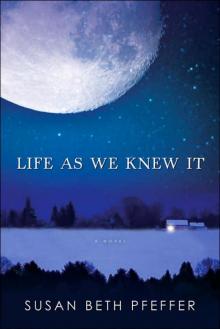 Last Survivors 01 - Life as We Knew It
Last Survivors 01 - Life as We Knew It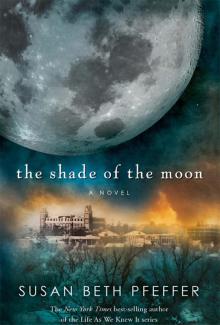 Last Survivors 04: Shade of the Moon
Last Survivors 04: Shade of the Moon Thea at Sixteen
Thea at Sixteen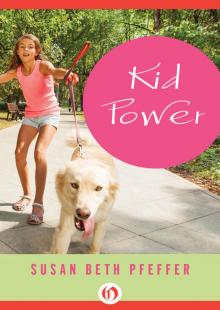 Kid Power
Kid Power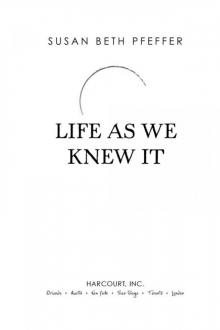 Life as We Knew It
Life as We Knew It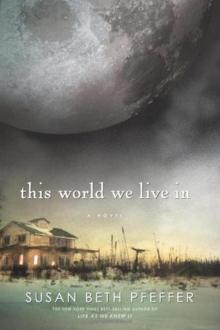 This World We Live In
This World We Live In Meg at Sixteen
Meg at Sixteen Blood Wounds
Blood Wounds The Beauty Queen
The Beauty Queen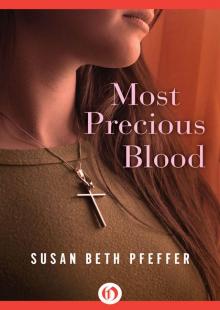 Most Precious Blood
Most Precious Blood The Dead and the Gone
The Dead and the Gone Sybil at Sixteen
Sybil at Sixteen Evvie at Sixteen
Evvie at Sixteen Getting Even
Getting Even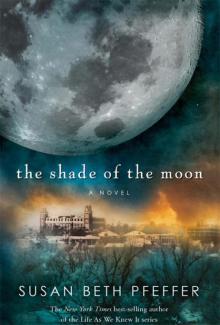 Shade of the Moon ls-4
Shade of the Moon ls-4 The Dead and Gone
The Dead and Gone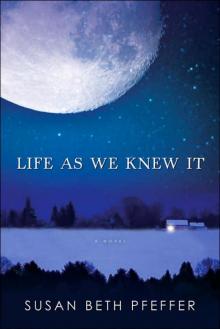 Life As We Knew It lawki-1
Life As We Knew It lawki-1 Fantasy Summer
Fantasy Summer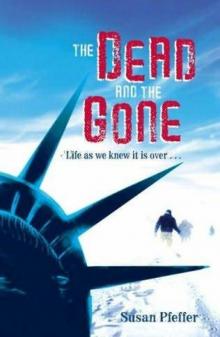 The Dead and the Gone ls-2
The Dead and the Gone ls-2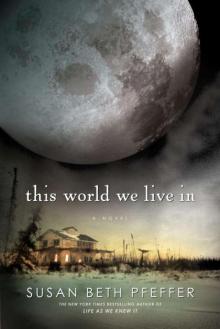 This World We Live In ls-3
This World We Live In ls-3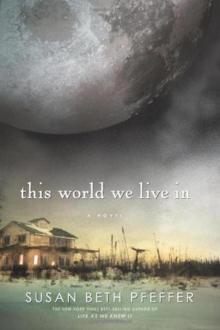 This World We Live In (The Last Survivors, Book 3)
This World We Live In (The Last Survivors, Book 3)